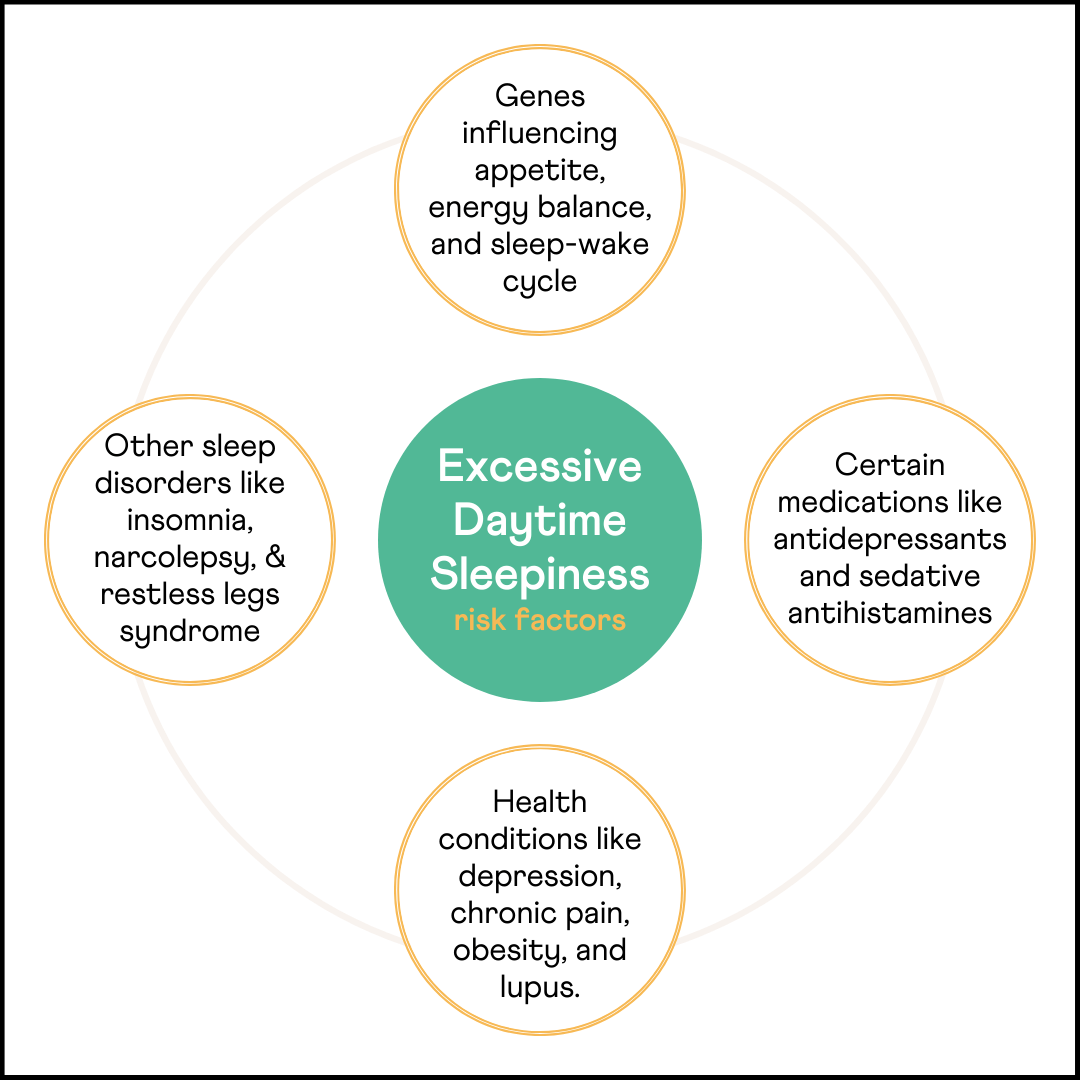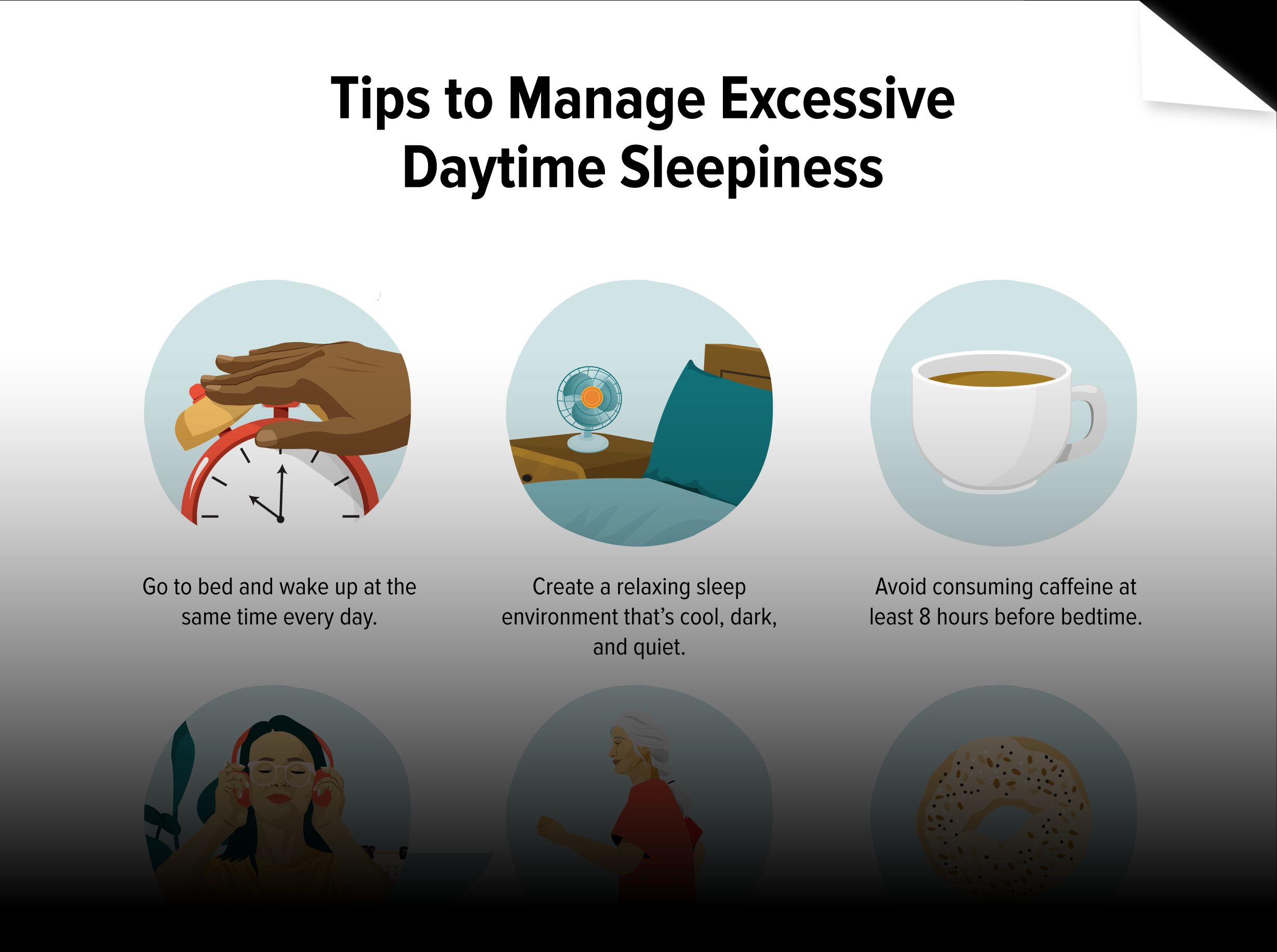Excessive daytime sleepiness can feel like an unending battle against fatigue. You know the drill: the struggle to stay awake during meetings, nodding off while reading, and feeling drained despite a full night’s sleep.
You’re not alone. This relentless tiredness can impact your work, relationships, and overall well-being. But there’s good news. Understanding the causes and solutions for excessive daytime sleepiness can transform your daily life. Imagine feeling alert, focused, and energized each day.
Dive into this article to uncover the secrets to conquering daytime sleepiness and reclaim your vitality. Your path to wakefulness starts here.

Credit: www.xcode.life
Causes Of Excessive Daytime Sleepiness
Excessive daytime sleepiness can feel like an endless battle against fatigue. You might find yourself dozing off during meetings, feeling sluggish at lunch, or struggling to stay awake during your favorite TV shows. Understanding the causes can help you address this issue and regain your energy. Let’s dive into the common culprits behind this relentless tiredness.
Sleep Disorders
Sleep disorders are often the root cause of daytime sleepiness. Conditions like sleep apnea can disrupt your breathing during sleep, causing frequent awakenings. You might not even realize it, but these interruptions can leave you exhausted.
Insomnia is another sleep thief. Tossing and turning at night can rob you of precious hours of rest. Have you ever spent the night counting sheep, only to feel like a zombie the next day?
Restless legs syndrome can also keep you up. The constant urge to move your legs disrupts your sleep cycle. Addressing these disorders can significantly improve your daytime energy.
Lifestyle Factors
Your lifestyle choices play a significant role in your sleep quality. Poor sleep habits, like inconsistent bedtime, can confuse your body’s internal clock. Have you noticed how late-night Netflix binges can leave you dragging the next day?
Caffeine and alcohol are sneaky saboteurs of sleep. That evening glass of wine or post-dinner espresso can interfere with your rest. Are you unintentionally sacrificing sleep for a short-lived buzz?
Stress and overwork can keep your mind racing at night. It’s hard to drift into dreamland when you’re replaying the day’s events. Could relaxation techniques before bed be your answer?
Medical Conditions
Medical conditions can also contribute to daytime sleepiness. Hypothyroidism slows your metabolism, leading to fatigue. If you’re feeling sluggish, could a thyroid check be overdue?
Depression is another factor. It often saps your energy and can disrupt your sleep patterns. Have you considered talking to a professional about your mental health?
Chronic fatigue syndrome leaves you feeling tired no matter how much you sleep. It might be time to consult a doctor if you suspect this condition. Could a medical evaluation provide you with clarity and relief?
Excessive daytime sleepiness is more than just an inconvenience. By identifying its causes, you can take steps toward a more energetic and fulfilling life. Are you ready to tackle your sleepiness head-on and reclaim your days?

Credit: ep.bmj.com
Symptoms And Indicators
Excessive Daytime Sleepiness (EDS) affects many individuals worldwide. It can disrupt daily life and productivity. Recognizing its symptoms is crucial for managing the condition. Symptoms and indicators vary but often overlap in three main areas. These areas include physical signs, emotional effects, and impacts on daily activities.
Physical Signs
Physical signs of EDS are often visible. Persistent yawning tops the list. Individuals may experience a heavy sensation in the eyelids. Frequent need to rest or nap during the day is common. Some might struggle with staying awake during passive activities. For example, while watching TV or reading.
Emotional Effects
EDS can impact emotional well-being significantly. Increased irritability is a common symptom. Mood swings can occur unexpectedly. Individuals may feel more anxious or depressed. Fatigue often exacerbates these emotional challenges. Concentration and memory might also suffer, leading to frustration.
Impact On Daily Activities
Daily activities can become challenging with EDS. Simple tasks might seem daunting. Work performance can decline due to lack of focus. Social interactions may suffer as well. Individuals might withdraw from activities they once enjoyed. Driving or operating machinery can become dangerous. Safety concerns increase significantly with EDS.
Diagnosis Process
Excessive daytime sleepiness can impact daily life and productivity. Knowing the diagnosis process helps in managing this condition effectively. Understanding each step can guide you towards better sleep health.
Medical History Evaluation
Doctors start by reviewing your medical history. They ask about sleep patterns and lifestyle. Questions about medications and existing health conditions are common. This information helps identify possible causes of sleepiness.
Sleep Studies
Doctors often recommend sleep studies to diagnose sleep disorders. These tests monitor your sleep patterns overnight. They measure brain activity, breathing, and heart rate. Results help in understanding sleep quality and detecting issues like sleep apnea.
Other Diagnostic Tests
Sometimes, doctors suggest additional tests for a comprehensive diagnosis. Blood tests check for thyroid issues or vitamin deficiencies. Mental health evaluations assess stress or depression. These tests help rule out other causes of daytime sleepiness.

Credit: www.healthline.com
Treatment Options
Excessive daytime sleepiness can disrupt daily life. It affects focus and productivity. Many people struggle with this issue. Various treatment options can help. Finding the right solution depends on individual needs. Exploring behavioral therapies, medications, and lifestyle modifications can offer relief.
Behavioral Therapies
Behavioral therapies focus on changing habits. Sleep hygiene is essential. Set a consistent bedtime and wake-up time. Avoid caffeine and electronics before sleep. Relaxation techniques help unwind. Meditation and deep breathing can reduce stress. Cognitive behavioral therapy is effective. It addresses negative thoughts about sleep. Therapy can improve sleep patterns.
Medications
Medications can provide relief from excessive sleepiness. Doctors may prescribe stimulants. These increase alertness. Modafinil is a common choice. It helps stay awake during the day. Antidepressants can also be beneficial. They aid in regulating sleep cycles. Medication effectiveness varies per individual. Consult a healthcare professional for guidance.
Lifestyle Modifications
Lifestyle changes can impact sleepiness. Regular exercise boosts energy levels. Aim for at least 30 minutes daily. A balanced diet supports overall health. Include fruits, vegetables, and lean proteins. Stay hydrated for optimal function. Limit alcohol and sugary drinks. Create a calming bedtime routine. Dim the lights and reduce noise. Prioritize relaxation before bed.
Preventive Measures
Managing excessive daytime sleepiness involves creating a sleep-friendly environment. Regular sleep schedules and limiting caffeine help. Exercise and a healthy diet can also improve alertness during the day.
Excessive daytime sleepiness can disrupt daily life. It affects productivity and well-being. Luckily, preventive measures can help manage this condition. By adopting certain lifestyle changes, you can reduce daytime drowsiness. Focus on sleep hygiene, diet, exercise, and stress management to improve your energy levels.
Sleep Hygiene Practices
Good sleep hygiene ensures restful nights. Create a consistent sleep schedule. Go to bed and wake up at the same time daily. Make your bedroom a restful environment. Keep it cool, quiet, and dark. Limit screen time before bed. Blue light from devices can interfere with sleep. Consider a relaxing bedtime routine. Activities like reading or meditation can help. Avoid caffeine and heavy meals before sleeping. They can disrupt your sleep patterns.
Diet And Exercise
A balanced diet boosts energy levels. Eat regular, nutritious meals. Include fruits, vegetables, and whole grains. Avoid sugary snacks and drinks. They cause energy spikes and crashes. Exercise regularly to maintain energy. Physical activity improves sleep quality. Aim for at least 30 minutes of exercise most days. Choose activities you enjoy. Walking, cycling, or yoga can be effective.
Managing Stress
Stress can lead to poor sleep. It affects your energy throughout the day. Learn stress management techniques. Practice deep breathing or mindfulness. These can calm your mind. Find time for hobbies and relaxation. They reduce stress and improve mood. Talk to someone if stress becomes overwhelming. Professional support can provide effective coping strategies.
When To Seek Professional Help
Excessive Daytime Sleepiness can disrupt daily life. Knowing when to seek professional help is crucial. Some symptoms may indicate underlying health issues. Ignoring them could worsen your condition. This section explores signs that require medical attention.
Persistent Symptoms
Daytime sleepiness that lasts for weeks may need a doctor’s visit. Frequent yawning and struggling to stay awake are warning signs. Sleep disorders like sleep apnea may cause these symptoms. If sleep doesn’t refresh you, consult a specialist.
Impact On Mental Health
Sleepiness can affect your mood and mental health. It may lead to anxiety or depression. Fatigue often reduces motivation. This can result in a lack of interest in activities. Seek help if your mental well-being is compromised.
Interference With Work Or Relationships
Daytime sleepiness can disrupt work performance. It may lead to mistakes or missed deadlines. Relationships might suffer too. Irritability and lack of focus can strain personal connections. If sleepiness affects your daily life, seek professional guidance.
Frequently Asked Questions
What Causes Excessive Daytime Sleepiness?
Excessive daytime sleepiness can result from sleep disorders, insufficient sleep, or poor sleep quality. Conditions like sleep apnea, narcolepsy, and insomnia often contribute to this issue. Lifestyle factors, such as stress, irregular sleep schedules, and poor diet, can also play a role.
Identifying the underlying cause is essential for effective treatment.
How Is Excessive Daytime Sleepiness Diagnosed?
Doctors diagnose excessive daytime sleepiness through medical history, sleep diaries, and questionnaires. They may recommend sleep studies, like polysomnography or multiple sleep latency tests, to monitor sleep patterns. These assessments help determine if underlying sleep disorders, such as sleep apnea or narcolepsy, are contributing to the condition.
Can Lifestyle Changes Help Reduce Daytime Sleepiness?
Yes, lifestyle changes can significantly reduce excessive daytime sleepiness. Prioritizing regular sleep schedules, creating a restful sleep environment, and reducing caffeine intake are beneficial. Additionally, incorporating regular physical activity and managing stress can improve sleep quality, leading to reduced daytime drowsiness.
Are There Medications For Daytime Sleepiness?
Medications can help manage excessive daytime sleepiness, depending on its cause. Doctors may prescribe stimulants or wakefulness-promoting agents for conditions like narcolepsy. However, it’s crucial to address underlying sleep disorders or lifestyle factors first. Always consult a healthcare provider before starting any medication.
Conclusion
Excessive daytime sleepiness affects daily life and productivity. Addressing it is important. Identifying the root cause helps manage the issue better. Simple lifestyle changes can make a big difference. Improving sleep habits often reduces daytime tiredness. Consult a doctor if sleepiness persists despite efforts.
Professional guidance ensures proper diagnosis and treatment. Quality sleep boosts energy and focus. This leads to a healthier and more active lifestyle. Taking steps towards better sleep can enhance overall well-being. Remember, a good night’s sleep is essential. Prioritize it for a happier, more productive day.
